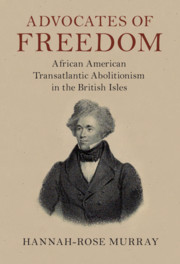Book contents
- Advocates of Freedom
- Slaveries since Emancipation
- Advocates of Freedom
- Copyright page
- Contents
- Figures
- Acknowledgments
- Dedication
- Introduction
- 1 “It Is Time for the Slaves to Speak”
- 2 “All the Bloody Paraphernalia of Slavery”
- 3 “[They Have] Not Ceased to Hold My Hand Since”
- 4 To “Frighten the Hyena Out of His Ferocity”
- 5 “I Would Much Rather Starve in England, a Free Woman, Than Be a Slave”
- 6 “Have No Fellowship I Pray You, with These Merciless Menstealers”
- 7 “My Name Is Not Tom”
- 8 “The Black People’s Side of the Story”
- Conclusion
- Bibliography
- Index
6 - “Have No Fellowship I Pray You, with These Merciless Menstealers”
Black Activism, the Confederacy, and Scientific Racism during the Civil War 1861–1865
Published online by Cambridge University Press: 07 September 2020
- Advocates of Freedom
- Slaveries since Emancipation
- Advocates of Freedom
- Copyright page
- Contents
- Figures
- Acknowledgments
- Dedication
- Introduction
- 1 “It Is Time for the Slaves to Speak”
- 2 “All the Bloody Paraphernalia of Slavery”
- 3 “[They Have] Not Ceased to Hold My Hand Since”
- 4 To “Frighten the Hyena Out of His Ferocity”
- 5 “I Would Much Rather Starve in England, a Free Woman, Than Be a Slave”
- 6 “Have No Fellowship I Pray You, with These Merciless Menstealers”
- 7 “My Name Is Not Tom”
- 8 “The Black People’s Side of the Story”
- Conclusion
- Bibliography
- Index
Summary
Chapter six explores adaptive resistance in Britain during the American Civil War. Black activists exploited this resistance strategy amongst a climate of growing scientific racism and pro-Confederate sympathy, two factors that were inseparable. Throughout the conflict, Black abolitionists used their testimony to revoke charges of Black inferiority and demanded Britons follow a policy of non-fellowship with slaveholders. Despite abolitionist networks which had dwindled at the start of the war, activists such as William Craft, Sella Martin and William Andrew Jackson lectured on both an abolitionist and non-abolitionist stage with a greater sense of urgency, convinced that the conflict’s outcome would mean either the consolidation or the removal of slavery. Craft and Martin in particular used dissonant language to target scientific racists such as Dr. James Hunt, who lectured and published work on Black inferiority. Hunt avidly supported the South and his friendship with Confederate propagandist Henry Hotze represented the synonymy of a cause that promoted slavery and racism, and as much as possible, Black activists used dissonant language to challenge such theories.
Keywords
- Type
- Chapter
- Information
- Advocates of FreedomAfrican American Transatlantic Abolitionism in the British Isles, pp. 219 - 254Publisher: Cambridge University PressPrint publication year: 2020



